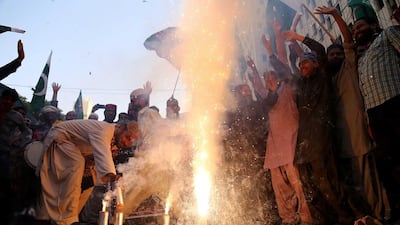The long-simmering animosity between India and Pakistan has boiled over once again.
Yesterday for the first time in nearly 50 years, India launched pre-dawn aerial strikes on its neighbour, crossing the border to target positions inside Pakistani territory. Pakistan retaliated by shooting down two Indian aircraft in its airspace earlier today.
A brief skirmish, but one with vast significance. The two nuclear-armed rivals have clashed repeatedly over the disputed region of Kashmir and this time, both national leaders have matched fiery words with equally incendiary action. Both seem to be fuelled by growing nationalist fervour in their countries – a potentially potent and explosive mix in two nations that have fought three wars in 71 years.
The targeting by Indian jets of the Pakistani side of the Kashmiri Line of Control, the de facto border between the two nations, represents a new escalation in hostilities, one that has not been matched for decades. The reciprocal shooting down of two Indian fighter planes and the detention of their pilots by Pakistan adds fuel to an already volatile situation. Prime ministers Narendra Modi and Imran Khan are playing a dangerous game of brinkmanship. As with all conflicts between India and Pakistan, it is not merely a question of military tactics but of politically managing the public's anger. In the emotive conflict over Kashmir, the second is far harder to handle.
This week's events are part of the reaction to a suicide bomb attack a fortnight ago in Pulwama in Indian-controlled Kashmir, which killed 40 Indian troops and left the nation reeling. The blast was subsequently claimed by the militant group Jaish-e-Mohammad – a proscribed extremist organisation that India claimed it was targeting in its cross-border raid on Tuesday.
Politically, this is a precarious moment for both leaders.
The last time tensions rose like this over Kashmir was the brief Kargil war of 1999, which cost hundreds of lives on both sides.
Mr Khan has only been in office for six months and this is his first major test in relations with India. Relatively unproven in government, he will not want to gift his domestic rivals the criticism that he is unable to stand up to India.
His address this afternoon sought to project a mix of strength, understanding of what is happening in Kashmir, and a conciliatory offer to India of talks.
Yet the real danger comes from the Indian side.
Mr Modi is weeks away from a vital Indian general election. The economy, one of the planks on which Mr Modi has based his political reputation, is stuttering and his Bharatiya Janata Party was hammered at the polls in December.
He knows any perceived weakness on such an emotive topic as Kashmir and India-Pakistan relations is capable of inflicting enormous electoral damage on him and the BJP.
Yet despite such a high-profile clash over the territory, nothing much is likely to change inside Kashmir itself. This disputed area has been an open wound since Partition in 1947 and remains a permanent obstacle to closer relations between the two countries. Insurgency and discontent on both sides of the Line of Control, in a Muslim-majority region that once wished to be autonomous, continue to fester. But both nations have failed to come to any solution, making Kashmir a useful vehicle for hawks on both sides, until occasionally, as now, the dispute spills across borders.
Both Mr Modi and Mr Khan stand to lose face if they back down. But if they do manage to engage in dialogue, rather than resorting to bombs and bullets, some compromise could be found and both sides could walk away with their political dignity intact.
With so much at stake on the Indian side, and so much pressure on a new prime minister on the Pakistani side, there is always the danger of a miscalculation, or a mistake, leading the two sides inexorably towards conflict.
When photographs emerged of one of the Indian pilots shot down over Pakistan, the Pakistani army sensibly and hastily stressed he was being treated well. This is just the sort of episode that could quickly escalate if there was a perception that soldiers from either side were being mistreated.
That was no doubt what Mr Khan had in mind when he warned that if the conflict escalated, “it would neither remain in my control nor in [Mr] Modi's”.
Talking tough on the Indian side about targeting terror camps inside Pakistan plays well at home, as does Pakistan showing dramatic footage of its military shooting down India's jets.
The two nuclear rivals have locked horns before; they could do so again. No one should underestimate what even a limited ground war – to say nothing of the potential for nuclear strikes – would mean in countries as populous as Pakistan and India. If there really is, as Mr Khan said today, a “new mindset” in Pakistan, India's leaders should test that out at the negotiating table, not on the battlefield.
Talking tough on the disputed Kashmir region is a staple of Indian and Pakistani politics. But now is a moment for the two leaders to look past old enmities and step back from the brink.


